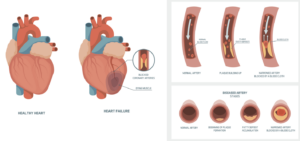Prioritize Your Heart Health: Understanding Coronary Heart Disease and the Power of Early Detection

February is National Heart Month—a time dedicated to raising awareness about heart health and empowering individuals to take control of their cardiovascular well-being. At Diagnostic Imaging Northwest, we believe that prevention and early detection are key to living a heart-healthy life. One powerful tool we offer is the CT Cardiac Calcium Score, a quick, non-invasive test that can help detect heart disease before symptoms arise. Let’s dive into the risk factors, prevention strategies, and how the CT Cardiac Calcium Score can provide you with life-saving insights.
Understanding Coronary Heart Disease (CHD)
Coronary heart disease (CHD) is the most common type of heart disease and the leading cause of death in the United States. CHD occurs when plaque—made of cholesterol, fat, calcium, and other substances—builds up in the walls of the coronary arteries. This buildup, known as atherosclerosis, can reduce blood flow to the heart, leading to chest pain (angina), heart attacks, and even sudden cardiac death.
Many people don’t realize they have CHD until they experience a major cardiac event. That’s why early detection and prevention are so crucial.

Risk Factors for Coronary Heart Disease
Certain risk factors increase your chances of developing CHD. While some are beyond your control, many can be managed through lifestyle changes and medical care.
Uncontrollable Risk Factors:
- Age: Risk increases for men after 45 and women after 55.
- Family History: A family history of heart disease increases your risk.
- Gender: Men are generally at higher risk at a younger age, though the risk for women rises after menopause.
Controllable Risk Factors:
- High Blood Pressure (Hypertension): Puts extra strain on your heart and arteries.
- High Cholesterol: Specifically, elevated LDL (bad cholesterol) levels contribute to plaque buildup.
- Smoking: Damages the lining of the arteries and raises blood pressure.
- Diabetes: Increases the risk of CHD significantly.
- Obesity: Especially belly fat, is linked to higher risk.
- Physical Inactivity: A sedentary lifestyle can lead to obesity and heart disease.
- Unhealthy Diet: Diets high in saturated fats, trans fats, salt, and sugar are harmful.
- Stress: Chronic stress may damage arteries and worsen risk factors.
Prevention: Steps You Can Take Today
❤️ Adopt a Heart-Healthy Lifestyle:
- Eat Smart: Focus on fruits, vegetables, whole grains, lean proteins, and healthy fats.
- Stay Active: Aim for at least 150 minutes of moderate aerobic exercise per week.
- Quit Smoking: Seek support to stop smoking and avoid secondhand smoke.
- Manage Stress: Incorporate mindfulness practices like yoga, meditation, or deep breathing.
- Maintain a Healthy Weight: Even modest weight loss can benefit heart health.
- Limit Alcohol Consumption: Drink in moderation, if at all.
- Control Blood Pressure, Cholesterol, and Diabetes: Work with your healthcare provider to monitor and manage these conditions.
Early Detection: The Power of a CT Cardiac Calcium Score
While lifestyle changes are critical, early detection can be life-saving. The CT Cardiac Calcium Score is a powerful screening tool that detects the presence of calcified plaque in the coronary arteries.
Why Consider a CT Cardiac Calcium Score?
- Non-Invasive & Quick: The scan takes just minutes and requires no injections or special preparations.
- Detects Silent Risk: It can reveal plaque buildup even if you have no symptoms.
- Risk Stratification: Helps your healthcare provider determine your risk of heart attack or stroke.
- Guides Treatment: If plaque is found, you and your doctor can develop a plan for lifestyle changes, medications, or further tests.
Who Should Get a CT Cardiac Calcium Score?
- Adults aged 40-70 with risk factors like high cholesterol, high blood pressure, diabetes, or a family history of heart disease.
- Individuals without symptoms who want a clearer picture of their heart health.
- Those who want personalized guidance on whether they would benefit from preventive therapies.
Referral and Cost Information:
- Referral Requirement: CT Cardiac Calcium Score studies require a referral from your physician.
- Insurance Coverage: When ordered as a screening exam, most insurances do not cover it. If your insurance includes this study in their coverage, we will bill your insurance.
- Self-Pay Option: For patients who do not have insurance or whose insurance does not cover this exam, Diagnostic Imaging Northwest offers Calcium Scoring for $149, due at the time of service when ordered as a screening exam.
Why Choose Diagnostic Imaging Northwest for Your Heart Screening?
At Diagnostic Imaging Northwest, we prioritize your heart health with advanced imaging services and compassionate care. Our CT Cardiac Calcium Score screening is designed to provide you with accurate, actionable results.
What You Can Expect:
- Expert radiologists specializing in cardiac imaging.
- Fast, reliable results shared with your healthcare provider.
- Convenient South Puget Sound locations – no need to travel to Seattle for this essential screening.
Take Charge of Your Heart Health Today
Your heart works tirelessly for you—show it some love this National Heart Month by understanding your risks, adopting heart-healthy habits, and considering a CT Cardiac Calcium Score. Early detection could mean the difference between a future heart attack and a healthy life.
Schedule your CT Cardiac Calcium Score today with Diagnostic Imaging Northwest. Learn more about this exam at dinw.com/cardiac-ct.
